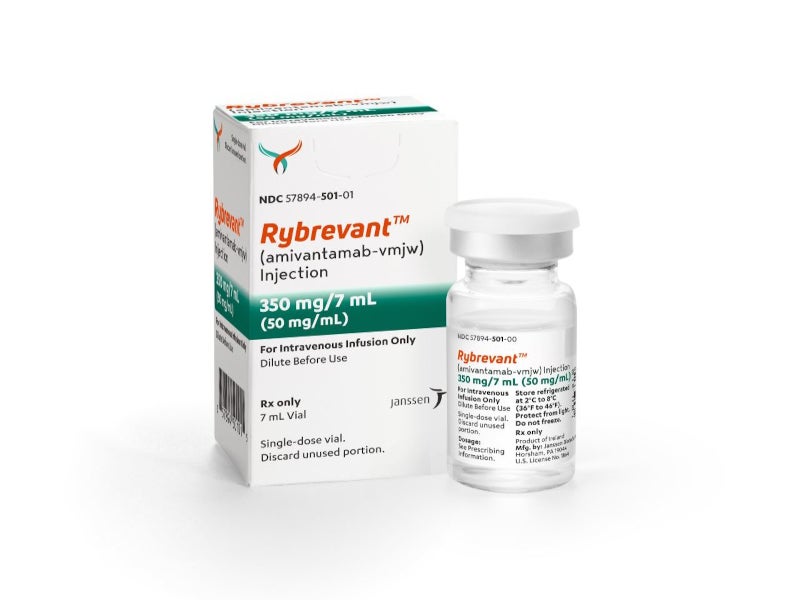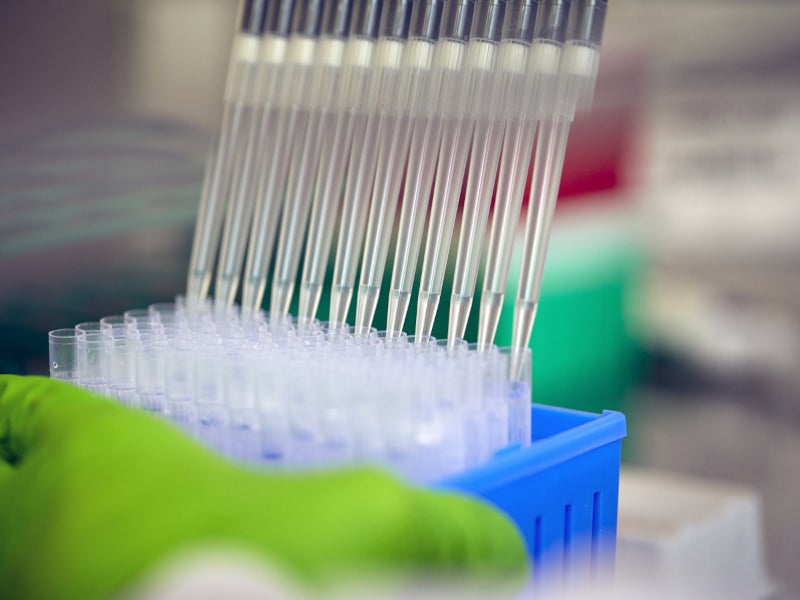Rybrevant (amivantamab-vmjw) is the first fully-human bispecific antibody indicated for the treatment of adult patients with metastatic non-small cell lung cancer (NSCLC) with epidermal growth factor receptor (EGFR) exon 20 insertion mutations, whose disease has advanced on or after platinum-based chemotherapy.
Rybrevant was developed by Janssen Pharmaceutical Companies, a company owned by Johnson and Johnson. In July 2012, Janssen collaborated with Denmark-based biotechnology firm Genmab to develop bispecific antibodies using Genmab’s proprietary DuoBody® bispecific technology platform.
Genmab will receive royalties on Rybrevant’s net sales as part of the agreement with Janssen.
Rybrevant is available in 50mg/ml (350mg/7ml) dosage strength as a sterile, preservative-free, colourless to pale yellow solution in a single-dose vial for intravenous infusion.
Approvals for Rybrevant
In March 2020, the US Food and Drug Administration (FDA) granted breakthrough therapy designation (BTD) to Rybrevant for the treatment of patients with NSCLC.
In December 2020, Janssen submitted a biologics license application (BLA) to the FDA and a marketing authorisation application (MAA) to the European Medicines Agency (EMA) seeking approval for amivantamab to treat metastatic NSCLC patients with EGFR exon 20 insertion mutations.
Rybrevant received priority review from the FDA, which was conducted under the FDA Oncology Centre of Excellence’s Project Orbis initiative.
In May 2021, Rybrevant received accelerated approval from the FDA for the treatment of adult patients with locally advanced or metastatic NSCLC harbouring EGFR exon 20 insertion mutations.
The drug is the first targeted treatment to receive FDA approval in this indication and is the first regulatory approval for a therapeutic product to have been created using Genmab’s DuoBody bispecific technology platform.
The FDA has also approved Guardant Health’s Guardant360 CDx liquid biopsy blood test as a companion diagnostic for Rybrevant. This is a next-generation sequencing test that provides an alternative to polymerase chain reaction (PCR)-based tests that fail to identify 50% or more of exon 20 insertion mutations.
NSCLC causes and symptoms
NSCLC is the most common form of lung cancer, representing 80% to 85% of all lung cancer cases.
EGFR is a receptor tyrosine kinase that is vital for the regulation of signalling pathways responsible for cell growth and division. EGFR mutations cause uncontrolled cancer cell growth and division, promoting tumours, and are the most common drivers of NSCLC.
EGFR exon 20 insertion mutations, the third most prevalent primary EGFR mutation, are observed in around 2% to 3% of NSCLC patients.
Some of the most common symptoms of NSCLC include the worsening of chronic cough, cough producing blood, wheezing, unexplained weight loss, chest pain or painful breathing, decreased appetite, and lung infections such as bronchitis and pneumonia.
Advanced stage symptoms include bone pain, headaches or seizures due to brain metastases, and lumps in lymph nodes.
Rybrevant’s mechanism of action
Rybrevant is an EGFR receptor-directed and mesenchymal-epithelial transition (MET) receptor-directed bispecific antibody. It blocks ligand from binding to the receptors and disrupts EGFR and MET signalling functions. This hinders tumour growth and kills cancer cells.
The presence of EGFR and MET on the tumour cell’s surface also marks cancerous cells for antibody-dependant cellular cytotoxicity and trogocytosis.
Clinical trials on Rybrevant
The FDA’s accelerated approval of Rybrevant is based on positive data from CHRYSALIS, an ongoing multi-centre, open-label, multi-cohort phase one clinical trial.
Rybrevant’s efficacy was evaluated in 81 patients with NSCLC and EGFR exon 20 insertion mutations whose disease progressed on or after platinum-based chemotherapy.
The primary endpoint of the study was the overall response rate (ORR), as assessed by a blinded independent central review (BICR) according to version 1.1 of the Response Evaluation Criteria in Solid Tumours (RECIST) specification.
In the study, patients received either 1050mg or 1400mg of Rybrevant once a week for four weeks, then every two weeks until disease progression or unacceptable toxicity. The drug achieved the ORR of 40% with 11.1 months of median response duration and a tolerable safety profile. Almost two thirds (63%) of responses lasted six months or longer.
The most common adverse events reported among patients treated with Rybrevant in the clinical trial included rash, infusion-related reactions, skin infections around the fingernails or toenails, muscle and joint pain, shortness of breath, nausea, fatigue, swelling in the lower legs or hands or face, sores in the mouth, cough, constipation, vomiting, and changes in certain blood tests.





